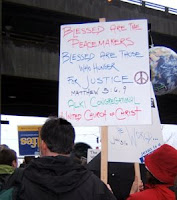
By Deanna Matzen, Operations Manager
For Lent, I chose something different from last year. You may recall that in 2008 I chose to give up driving to work. It was a very action-oriented choice though some of the benefits were more time to pray while walking and enjoying nature during my alternative commute. This year I decided to do something more physically passive, but spiritually active. I am going to commit to pray for the environment every day.
I am a big fan of prayer and am involved in prayer ministry at my church. But what I rarely pray for is the environment or the faith-based environmental movement. I firmly believe that as activists, we so often forget about one of our most powerful tools - prayer. I hope that many of you will join me on this journey of prayer.
To make praying for the environment a little easier for myself and for anyone wanting to join me, I have developed a prayer "map." Modeled after a tool I learned in a Lutheran Sunday School growing up, it will aid us in having a balanced prayer life. The mnemonic device is ACTS - adoration, confession, thanksgiving, and supplication. Here is my weekly prayer schedule, I hope you will follow along with me:
 Feb 25 – Adoration: Praise for God for the aesthetic beauty of creation and use nature images as metaphors for the character of God
Feb 25 – Adoration: Praise for God for the aesthetic beauty of creation and use nature images as metaphors for the character of God- March 4 – Confession: Confessing on behalf of yourself and God’s people how we have sinned against the earth
- March 11 – Thanksgiving: Thank God for being forgiven of our sins and all the ways God provides through creation
- March 18 – Supplication: Pray for Earth Ministry’s work, operations, staff, and board
- March 25 – Supplication: Pray for justice for creation and people
- April 1 – Supplication: Pray for God's people to engage in action, advocacy, and acknowledgment of the world's needs
- April 8 (Holy Week) –Praise & Thanksgiving for the redemption of all creation & for signs of hope
I will also use a few books on prayer to help me through these weeks: Praying with St. Francis, Praying with Julian of Norwich, and The Celtic Book of Daily Prayer, to start.
As of yesterday, I have already begun making time to praise God for creation and using nature images to reflect God's character. The hardest part is staying focused and making the time. But the time I have spent has been sweet. Praising God is hard to do. It doesn't come naturally, so the easiest way I've found to praise God is through song. I attend a church that sings a lot of contemporary Christian music. Here are two of the songs I have been singing, inspired by the Psalms (another great place to find praise for creation and the Creator):
I praise Your Name among the nations
I praise Your Name with all my heart
I join my voice with all creation
Giving You praise for Who You are
And the rocks will not cry out before me
I will ever sing Your praise
Blessings You have poured out on me
Everything, Lord, You gave everything and more
*******
Your love, O Lord, reaches to the heavens
Your faithfulness stretches to the skies
Your righteousness is like the mighty mountains
Your justice flows like the ocean’s tide
I will lift my voice to worship You, my King
I will find my strength in the shadow of Your Wings
Amen

















